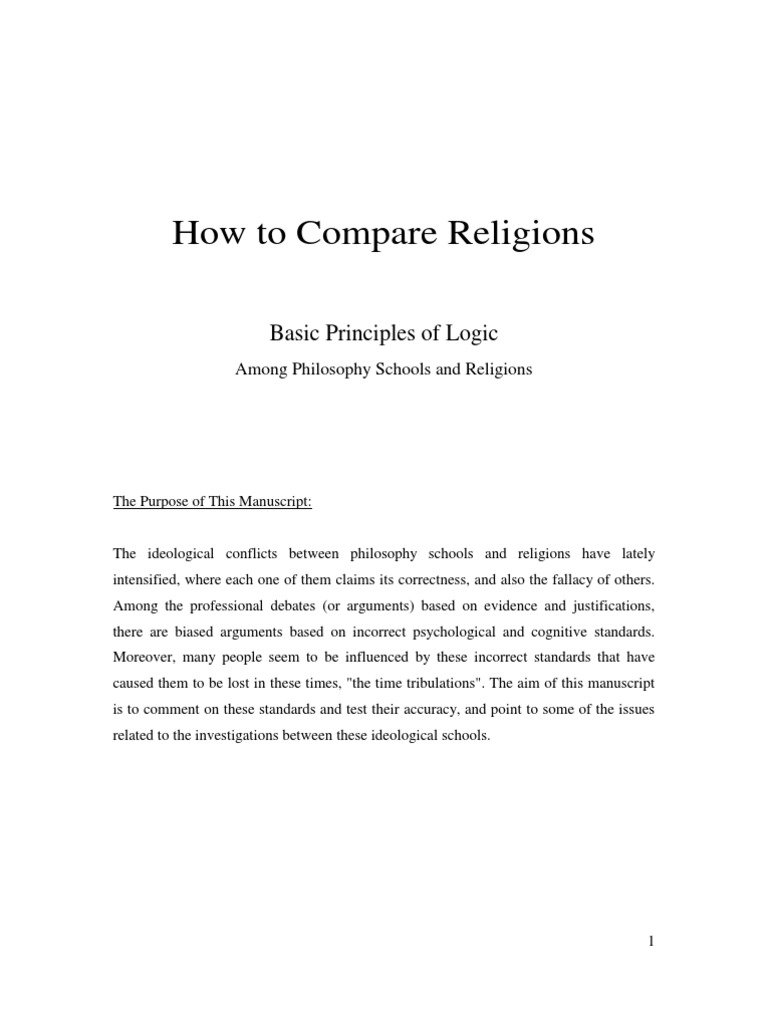The quest for truth is an intrinsic aspect of human existence. Throughout history, individuals have sought to comprehend the divine, endeavoring to reconcile the diversity of religious beliefs with universal truths. Bahá’í teachings provide a framework for understanding and appreciating this quest through the lens of comparative religion. This article explores the Bahá’í perspective on the comparative study of religions, elucidating key principles and their implications for seekers of truth.
1. The Unity of Religions
At the core of Bahá’í philosophy is the tenet that all major religions stem from a single, divine source. This principle of the unity of religions posits that the manifestations of God, such as Jesus, Muhammad, and Bahá’u’lláh, are not isolated phenomena but part of a continual revelation to humanity. Each religious tradition brings forth a unique perspective that contributes to a more comprehensive understanding of divine truth.
This concept encourages adherents to investigate the underlying similarities among religions rather than focusing solely on their differences. By recognizing that religious diversity reflects various interpretations of a singular truth, individuals may embrace a more inclusive approach to spirituality, fostering interfaith dialogue and collaboration.
2. Historical Context and Progressive Revelation
The Bahá’í teachings assert that divine revelation is not static but evolves over time, adapting to the spiritual and social needs of humanity. This doctrine of progressive revelation emphasizes that each religious leader addresses the specific circumstances of their era while simultaneously laying the groundwork for future advancements in spiritual understanding.
For instance, while early teachings may have focused on moral imperatives suitable for their time, contemporary revelations address global issues, such as unity and environmental sustainability. This historical context allows believers to appreciate the relevance of each religion’s teachings within their cultural milieu, fostering a deeper comprehension of their spiritual significance.
3. The Role of Reason and Investigation
Bahá’í teachings advocate for the use of reason and independent investigation when exploring matters of faith. Adherents are encouraged to question and examine religious texts, not merely to accept doctrines uncritically. This methodology promotes an inquisitive spirit, allowing seekers to discern truth through diligent study and thoughtful reflection.
By engaging in comparative analysis of differing religious ideologies, individuals often uncover profound insights into shared moral principles, ethical teachings, and concepts of the divine. As a result, the pursuit of knowledge becomes a transformative journey marked by discovery rather than dogma.
4. Common Ethical Foundations
Another salient feature of Bahá’í teachings is the recognition of common ethical foundations across various religions. Many spiritual traditions espouse values such as compassion, justice, and honesty. These commonalities serve as a robust framework for interfaith dialogue, highlighting the shared objectives among diverse religious groups.
By focusing on these moral principles, individuals can transcend their historical prejudices and build bridges of understanding. Cultivating a sense of empathy and respect for different viewpoints fosters a harmonious coexistence within a pluralistic society, promoting global peace and unity.
5. The Need for Global Citizenship
In an increasingly interconnected world, Bahá’í teachings stress the importance of global citizenship. As barriers between cultures diminish, the need for cooperation among various religious communities becomes ever more pressing. The teaching that humanity is one family underlies this concept, urging adherents to recognize their shared responsibility for the well-being of the planet and its inhabitants.
Comparative religion studies serve as a valuable tool for cultivating global citizenship. By understanding the common aspirations and spiritual experiences that bind humanity together, individuals can effectively collaborate toward the greater good, fostering a spirit of solidarity across cultural boundaries.
6. Interfaith Dialogue as a Pathway to Understanding
The Bahá’í faith actively promotes interfaith dialogue as a means of enhancing mutual comprehension among diverse religious communities. Engaging in conversations that explore philosophical and theological differences not only dispels misconceptions but also reveals deeper truths about human existence.
Facilitating interfaith gatherings creates opportunities for communal learning and shared experiences, where adherents of disparate traditions can celebrate their uniqueness while appreciating the universal values they uphold. Such dialogues are pivotal in dismantling stereotypes and fostering an appreciation for diversity as a strength rather than a source of division.
7. The Transformative Power of Comparative Religion
The study of comparative religion, through the lens of Bahá’í teachings, is not merely an academic pursuit; it represents a profound exploration of humanity’s spiritual nature. By understanding the commonalities among faiths, individuals can embark on a transformative journey—one that cultivates greater empathy, deepens personal faith, and inspires collective action toward peace and justice.
As seekers delve into the essence of each religion, they may discover a tapestry woven from threads of compassion, love, and truth—an interconnectedness that transcends individual beliefs. In this intricate mosaic of faith, the search for truth becomes not only a personal endeavor but also a communal responsibility.
Conclusion
Comparing religions within the framework of Bahá’í teachings illuminates a path toward understanding the intricate relationship between humanity and the divine. Acknowledging the unity of religions, the role of reason, shared ethical foundations, and the need for global citizenship reinforces the belief that, in the pursuit of truth, each religious tradition serves as a vital contributor to the collective spiritual journey. Through active engagement and dialogue, individuals can embrace their roles as seekers, poised to bridge gaps and foster harmony in an increasingly fragmented world.
